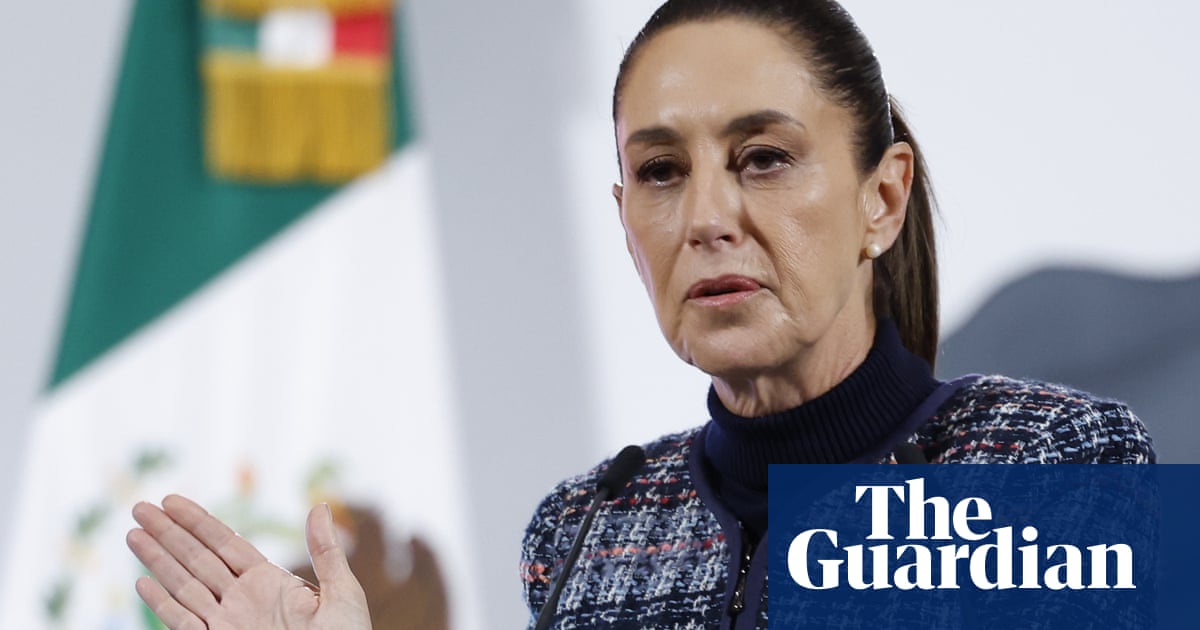Mexican presidentClaudia Sheinbaumexpressed frustration at US sanctions against three Mexican financial institutions accused of laundering drug money, and said the US has not yet provided any evidence of criminal activity.
“Until now, the treasury department has not sent any proof that indicates there is money laundering,” Sheinbaum said. “We will act if there is proof.”
She then publicly requested the treasury department “send proof, if they have it, so we can accompany them in the process”.
The US treasury department announced on Wednesday it was placing sanctions on three separate Mexican financial institutions, accusing them of being used to launder money for organized crime.
The three institutions identified by the treasury’s financial crimes unit (FinCen) are the large commercial banks CiBanco and Intercam, and the brokerage firm Vector Casa de Bolsa. FinCen is accusing them of laundering money linked to fentanyl trafficking.
“Financial facilitators like CiBanco, Intercam, and Vector are enabling the poisoning of countless Americans by moving money on behalf of cartels, making them vital cogs in the fentanyl supply chain,” treasury secretary Scott Bessent said in a statement.
“Through the first use of this powerful authority, today’s actions affirm [the] treasury’s commitment to using all tools at our disposal to counter the threat posed by criminal and terrorist organizations trafficking fentanyl and other narcotics.”
Wednesday’s announcement represents a further escalation by the Trump administration towards organized crime in Latin America. After Trump’s inauguration, the administration declared a number of Mexican criminal groups as terrorist organizations.
Other actions by the US have led to friction between the Mexican government and the Trump administration. Earlier this year, the Trump administration imposed 25% punitive tariffs on many imports fromMexico, in an attempt to pressure the country to halt fentanyl trafficking and migration towards the US.
Additionally, the administration began revoking visas for some Mexican political figures, preventing them from traveling to the US. According toreportingby ProPublica, the administration has a list of a number of politicians accused of having ties to the drug trade, including allies of Sheinbaum.
The treasury department says its actions come after acts passed by Congress provided the department additional authority to target money laundering networks linked to fentanyl trafficking.
Fentanyl leads to tens of thousands of overdose deaths in the US every year. The drug is primarily manufactured in Mexico by criminal groups using precursor chemicals from China. It is typically pressed into pills, trafficked into the US and distributed nationwide.
According to Sheinbaum, Mexican financial investigation agencies received information from the treasury department regarding the three financial institutions and transactions with Chinese businesses.
Mexican officials, who viewed the evidence as insufficient, launched their own investigation and also requested further information from the US regarding the transactions.
Sheinbaum says the US did not follow up in response to Mexico’s request.
“We are not going to cover for anyone. There is no impunity,” Sheinbaum said. “But it has to be demonstrated that, effectively, there was money laundering. Not with statements, but with hard evidence.”
The treasury department, in its release, included different allegations against the institutions.
In one instance, the department said, a CiBanco employee created an account in 2023 to launder $10m for a Gulf cartel leader. In another case, Intercam executives in 2022 allegedly met with suspected members of the New Generation Jalisco cartel “to discuss money-laundering schemes, including transferring funds from China”.
And in a third example, the department claimed that from 2013 through 2021, a Sinaloa cartel money mule laundered $2m from the US to Mexico through the Vector firm.
“CiBanco clarifies that it does not hold commercial relations outside of legality, and reiterates the compliance of all guidelines established by the relevant authorities,” CiBanco said in a statement on its website. “CiBanco maintains constant communication with corresponding Mexican and United States authorities and underscores its willingness to collaborate.”
Mexican banks are not the only financial institutions accused by the US of laundering dirty money for organized crime.
Last fall, a US bankadmittedto helping Colombian criminals launder money. The FinCen investigation led to a $1.3bn penalty, the largest penalty against a financial institution in history.
Last year, the justice department unsealed anindictment, accusing a number of people of laundering money for the Sinaloa cartel and for “groups linked to Chinese underground banking”.
The multi-year DEA investigation, called Operation Fortune Runner, found that the alleged criminals used Citibank ATMs in California to launder drug money.
